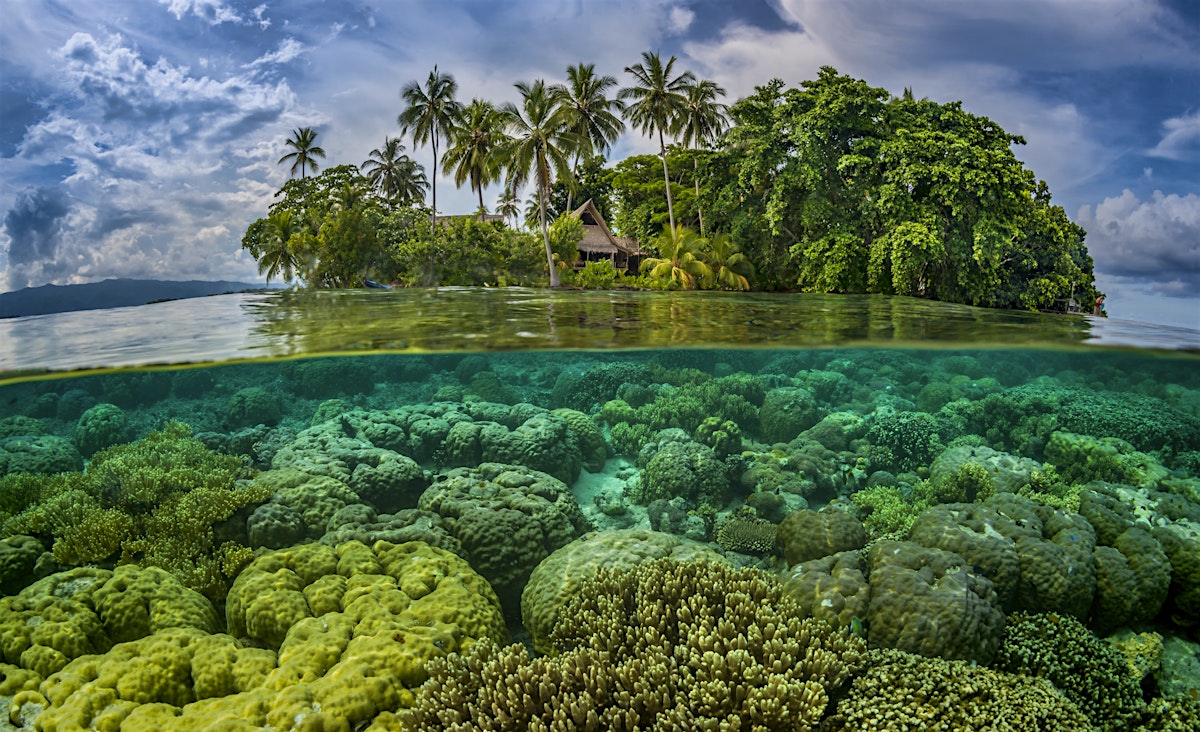Solomon Islands - utopialand/Utopia GitHub Wiki
View SOLOMON ISLANDS on Wikipedia
Capital: Honiara
Official: English

- Solomon Islands, country in the southwestern Pacific Ocean. It consists of a double chain of volcanic islands and coral atolls in Melanesia. The country comprises most of the Solomons chain, with the exception of Buka and Bougainville, two islands at the northwestern end that form an autonomous region of Papua New Guinea.
- Once a British protectorate, Solomon Islands achieved independence as a republic in 1978. Honiara, on the north coast of Guadalcanal Island, is Solomon Islands’ capital and largest city.
- The main islands of the group are large and rugged, rising to 7,644 feet (2,330 metres) at Mount Popomanaseu on Guadalcanal. They lie in two parallel chains running northwest-southeast: the southern chain includes Vella Lavella, the New Georgia Islands, Savo, and Guadalcanal; the northern, Choiseul, Santa Isabel, and Malaita. The chains converge on San Cristobal (Makira Island). The Santa Cruz Islands are a group of small islands located some 345 miles (555 km) east of Guadalcanal; the largest island in the group is Nendö (also called Ndeni Island or Santa Cruz Island). Geologically, the Solomon Islands are part of the volcanic arc extending from New Ireland in Papua New Guinea to Vanuatu.
Hon. Rick Houenipwela
Prime Minister of Solomon Islands
National Parliament of Solomon Islands
P.O.BOX G19
Vavaya Ridge
Honiara, Solomon Islands
Telephone: +677 28520/ 23424
Fax: +677 24272
Ministry of Lands, Housing and Survey
P.O. Box G38
Hibiscus Avenue
Honiara, Solomon Islands
Telephone: (+677) 21511 (Land Center)
Land tenure
- The majority of land in Solomon Islands (86%) is held under customary tenure, whilst the remaining 14% is alienated land (Corrin, 2012). Most forest area is found on customary land.
- There is no freehold title in Solomon Islands. Land can only be held as perpetual estate (restricted to Solomon Islanders), fixed-term estate (not exceeding 75 years), or leasehold (Land and Titles Act, s.112, 113, and Part XI). Land can only be converted from customary (tribal) land by selling or leasing it to the Commissioner of Lands or a Provincial Assembly (Part V).
- The system of customary (tribal) land tenure has been preserved since Independence. The law provides that customary land is to be occupied, used and disposed of in accordance with current customary usage (s. 239(1), Land and Titles Act). As there is no system which allows for customary land to be surveyed and registered, it is often very difficult for outsiders to identify land boundaries and to identify who ‘owns’ the customary land. Land disputes are common.
- Customary land in Solomon Islands is held communally, by a tribe, which includes a clan or line of descendants. There may often be no single landowner group. More often, there are multiple groups which hold multi-layered rights to ownership and use of land and forest (Corrin, 2012 p. 27-28).
- To emphasize the communal nature of land tenure under customary law, the Solomon Islands Law Reform Commission has recently recommended that all legislation dealing with land should be amended to use the term “tribal land” rather than “customary land”, and that existing legislative frameworks be amended to formally recognise tribal ownership of tribal land (SICLRC, 2012 p. 18-20).
- There are very strong legal restrictions under the land law which restrict how customary land can be dealt with and disposed of. Only a Solomon Islander can ‘own’ customary land and interests in customary land (Land and Titles Act , s. 241). Land (and interests in land) can only be transferred between Solomon Islanders according to custom, and any contract or agreement that purports to transfer land or affect an interest in customary land outside custom (e.g. to a non-Solomon Islander) can be declared void by the courts (ss. 240, 241).
- In the context of REDD+, this provision could restrict the way in which contracts or emission reduction agreements between customary landowners and third parties (such as the government or a foreigner) can be made if the contract/agreement seeks to restrict the manner in which the land can or cannot be used or if the contract/agreement purports to dispose of carbon rights (Corrin 2012:25). Ordinarily, the granting of timber rights over customary land to a third party would also breach the prohibition on disposing of customary interest in land, but this is permitted because of a specific exemption under the Forest Resources and Timber Utilisation Act (s. 43).
- The only way that land or interests in land can be transferred outside custom are through compulsory acquisition by the government for a public purpose (s. 71), or by leasing the land to the Commissioner of Lands or a Provincial Assembly (s. 60), after which it is then registered as a perpetual estate. Because of the risks to tribal groups of converting customary land tenure, and the time and cost involved, REDD+ activities which rely on this approach are unlikely to be acceptable to customary landowners.
Cyprian Bridge Island
Indispensable Reefs
Kennedy Island
Makalom
Malaulalo
Mborokua
Tetepare Island
Tinakula
 Source:
Source: